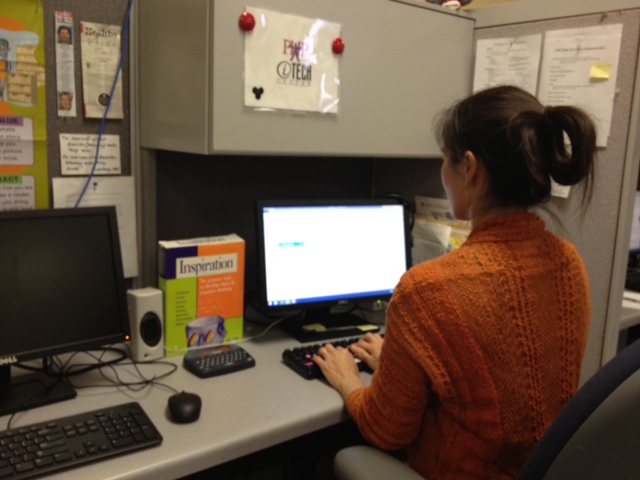by Janet Nunez, AT Specialist, Parents Helping Parents iTECH Center 
Yesterday I met up with an old acquaintance of mine, who I hadn’t seen for 10 years, at a neighborhood coffee shop. Leslie and I sipped our first cup of coffee reminiscing and the next cup trying to catch up. The third cup finally brought us to our present lives. With tears in her eyes she confided in me that she was pretty distraught over the idea of her daughter going off to college.
“Empty-nest syndrome – she’ll get over it,” I thought to myself with a knowing smile. But as Leslie continued, I realized that wasn’t the case at all.
“My daughter, Samantha,” she said, “has a learning disability …dyslexia, to be exact.”
Working in an agency that serves people with disabilities, my ears perked up. “Go on,” I urged.
Leslie said that even with accommodations at school, and weekly tutoring that her daughter was still struggling. Leslie also shared that she was not only worried, but exhausted – spending countless hours each night helping Samantha get through homework, usually with both of them ending up in tears. Leslie could not imagine how her daughter could possibly survive in college.
The sad truth is that Leslie has reason to worry. Research shows that Samantha can expect little help in college. Despite growing awareness and federal mandates, only 17 percent of learning-disabled college students receive any kind of help, compared to 94 percent of high school students (http://hechingerreport.org/colleges-respond-to-growing-ranks-of-learning-disabled/). It’s no wonder that parents are freaking out.
“Well, now it’s my turn to share,” I said in my most positive voice. “There are ways to give Samantha a fighting chance to beat the odds.” I hesitated, as I wasn’t sure where to start. As I considered the many factors that can influence student success: good self-advocacy skills, the ability to explain your needs to others and understanding where and how to access resources, I decided to start with something more immediate and tangible.
“Have you ever explored Assistive Technology (AT) for Samantha?” I asked. “There are many software programs and tablet apps that can help students in college with reading, writing, and organization. Why not bring Samantha in to our AT demonstration center to try out some of these programs? They may end up helping her immensely and give her the support she needs to be successful… without you by her side.”
Leslie leaned back in her chair and ordered her fourth cup. She looked a bit more relaxed. “Tell me more about your center and what you do… I’m listening,” she said. “But first, where’s the restroom?”
******************************************
Samantha’s story is more common than you think. PHP’s iTECH Center www.php.com/services/itech is just one California’s AT centers www.abilitytools.org/resources/at-centers.php that can help students like Samantha improve their chances for success.
The iTECH Center offers individuals, parents and professionals a chance to explore the technology that they’ve read about or never knew existed. Through our individualized appointments, group trainings and information and referral, we reach thousands of individuals each year, of all ages and all disabilities, and assist them in understanding how assistive technology can make a difference in their lives.




